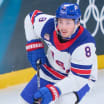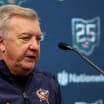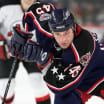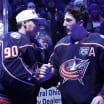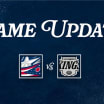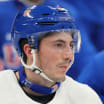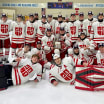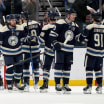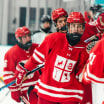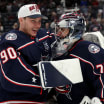Kirill Marchenko couldn’t quite believe the stat when he was told – mostly because it was untrue.
Yet, it was believable enough that Marchenko didn’t question it.
At the Blue Jackets’ exit day interviews, a reporter pointed out Marchenko had a stretch this season in which he scored just two times in 28 games. It wasn’t quite that bad – Marchenko's worst goal-scoring stretch of the season featured two tallies in 19 games from late December to mid-February – but Marchenko was dissatisfied enough with his season to take it at face value.
“Oh my God,” he said before adding a comment marked by his typical sense of humor. “Bad season.”
It wasn’t a bad season by any stretch – Marchenko went from 21 goals and 25 points as a rookie to 23 tallies and 42 points – but the Russian wing was still not exactly pleased with his performance. It wasn’t a traditional sophomore slump, but Marchenko felt the impact that many NHLers run into during their second season through the league.
“The second season was not easy for me,” he said. “I think for every player in the NHL, the second season is tough. It was not the best season. It was not a great season. Normally, I can be better than this season for sure. But I learn something about me, about the small details on the ice. If I start to explain, we’d be here for an hour. I just think to myself and try to work in the summer.”
Surely, reporters would have been fine had Marchenko elaborated, but the point was clear. He simply wasn’t pleased by how year two went, in part because he was so streaky – Marchenko preceded his midseason scoring drought with six goals in seven games, then had six more in a six-game stretch of March and April. But outside of those 13 games, he had 11 tallies in 65 games
But as he said, he’ll look to take the lessons he learned and apply them this offseason, with an eye on being a more consistent sniper in 2024-25.
“We will work in the summer,” he said. “Every season, every game, every practice in the NHL is making me better, and I’m starting to understand more. It’s just about experience.”
Russians Look Back
While Marchenko acknowledged the season was tough on him, one thing he’ll likely always remember – along with fellow forwards Yegor Chinakhov and Dmitri Voronkov – is playing with his countrymen on the Russian Line.
There were even times that with defenseman Ivan Provorov and goaltender Daniil Tarasov on the ice, the Blue Jackets would send five Russian-born players over the boards at one time. But the three forwards gained the most notoriety, outscoring teams 13-8 per MoneyPuck.com.
In addition, according to the site, the trio comprised the most common line combination used by the Blue Jackets this year at 5-on-5, skating almost 263 minutes together over 30 games.
“It’s fun to play together because we can try to create some moments,” Chinakhov said. “We try to speak in Russian. Nobody understands us. Some jokes and everything. It’s pretty fun, and we like that.”
The problem came as that while the end results were occasionally good, the underlying numbers were not. At times, the group fell victim to too much east-west play and was pinned in its own end more than the coaches would like, and the line’s expected goals percentage of 42.1 percent was 110th of the 116 NHL forward lines to play at least 150 minutes together per MoneyPuck.
The good news is this was just a trial run, a new look that has some potential, and the players could very well end up together down the road again as well. If they do, they’ll look forward to the opportunity.
“We enjoy it together,” Marchenko said. “We played good for 12 games, but after that it was tough to enjoy it. We started to play bad. Didn’t have good chances. But when we played good and we had good games, we enjoyed it for sure.”
The Russians’ humor was also on point during exit day. When asked how it was to teach Voronkov some English, Chinakhov laughed.
“Hard,” he said.
Tarasov also had a quip when it comes to honorary Russian forward Alexandre Texier, who spent much of the year hanging out with the group and even picked up a little of the language along the way.
“We have another 25 percent Russian – Tex – with us,” Tarasov joked. “He’s getting there. His Russian is better than Voro’s English.”
Malatesta Catches Eyes
If you’re a CBJ fan and someone mentions a player named Jimmy, you might not immediately know who he is.
But James Malatesta – “Jimmy” to his teammates – did a lot at the end of this season to catch the attention of his teammates and fans alike.
The 20-year-old Montreal native was called up amid the rash of injuries suffered by the Blue Jackets late in the season and made an impact. He finished with two goals and two assists in 11 games, but he really stood out with his physical play, notching 41 hits and dropping the gloves in his NHL debut.
He has some scoring touch – he was the MVP of the QMJHL playoffs and Canadian Hockey League’s Memorial Cup last year – but his energetic, physical game is what will eventually make him stick in the NHL.
“Jimmy was a bright spot,” Sean Kuraly said. “I think you want to get to the point that’s the expectation, the standard for a guy like that to come in and bring that energy and bring that work ethic, and kudos to him. He did it. I think he met the expectations and the standard.”
After last year’s dominant postseason performance at the highest levels of Canadian junior hockey, Malatesta has had a solid debut season both with the Blue Jackets and the Cleveland Monsters. At the AHL level, he notched 12 goals and 10 assists in 56 games during the regular season, and he posted 79 penalty minutes and three fights, a nod to his style of play.
“As far as Mally goes, he came in right away and had no fear,” Mathieu Olivier said. “He made an impact. His first game, he had eight hits and he got into a fight. I know I didn’t do that in my first game. He found a way to have an impact beyond the stats.
“Playing with him is so easy because he just plays straightforward hockey. He works hard, he skates, he’s on pucks, he’s physical. He also has some playmaking abilities – obviously he’s a Memorial Cup MVP. He was great to have come in.”
Jenner Says Thanks
It was a tough end to the season for captain Boone Jenner, and it had nothing to do with hockey.
The team’s leader and his wife, Maggie, acknowledged late in the season that the two’s first son had been stillborn. The captain returned to practice to be with his teammates in the final days but did not play after a March 28 game vs. Carolina.
When he stepped up to chat on exit day, Jenner wanted to thank everyone who had supported him during that unimaginably difficult stretch.
“I just want to say thank you to everyone for the support for my wife and I the last couple weeks,” he said. “It’s been a tough couple weeks, but the support from the team, players, management, ownership, the fans, it’s just been overwhelming. We’re very blessed to have the support we have, and from my wife and I, we really appreciate it.
“The hockey world is great when times like this come. It’s a pretty special world to be a part of, so I just want to say thank you everybody, especially our fans, everybody on the team and coaches, management, (media) in here. We’re very appreciative of that, so thank you.”
What’s in a Number?
Rest assured, Twitter – or X – users. Adam Boqvist has heard you loud and clear.
It’s a natural thing to wonder, as the No. 27 has seemingly been cursed over the years in the CBJ organization. Ryan Murray wore the number on the Blue Jackets blue line and battled injuries throughout his career, and Boqvist is in the same boat.
This year, because of multiple injuries and a series of healthy scratches at the start of the season, he played in just 35 games. In all, the talented young defenseman has played in just 133 of a possible 246 contests in his three years with the Blue Jackets.
With that in mind, CBJ fans have expressed the thought that Boqvist should change his number, all in the hope some better luck might help him stay healthy and on the ice. This offseason, it appears Boqvist agrees.
“From the start, I just got No. 27 in Chicago,” he said. “I never picked a number. I feel like now that I’m coming into my sixth season, maybe it’s time to pick a number and hope for the best. That’s what I’ve been seeing on Twitter, so hopefully that can help a little bit.”
Boqvist said he’ll have to run the change by the powers that be, and though he has a number in mind, he won’t say it publicly. (He did mention he’d worn it before in his career back in Sweden, and we will note it is a number that is available on the current squad.)
Luck and superstition aside, the constant injuries have put a strain on Boqvist, who was playing some of his best hockey this season before a series of freak injuries – being hit in the face by a puck on the bench and then later being checked into a linesman along the boards – limited him again.
“You think about it a lot, especially when you’re hurt and you’re not with the team and not on the road,” he said. “You have a lot of time with yourself. That’s when all the thinking goes on, and obviously it’s not the way I wanted it to be. I want to play every game, 92 games.”
While Boqvist showed some major improvement this year at age 23 – he spent an extended amount of time on the top pair with Zach Werenski when healthy – he was left a little disappointed by his offensive production this season. After notching 16 goals in his first two seasons in Columbus, he finished this year with a 1-9-10 line.
“I think I played pretty good,” he said. “Obviously not as many points as I would like, and I played power play all year and I’m not happy with that. I don’t think I did a good enough job there, but I think my overall game took a little bit of a (jump). I think I played better defensively than I have in the past, and playing with Z consistently has helped as well. I’m not gonna stand here and say I had a really good year, but I think I took some steps in the right direction.”
Nylander’s Big Finish
When the Blue Jackets traded Emil Bemstrom to Pittsburgh for Alex Nylander and a draft pick in late February, it wasn’t the kind of deal that made waves across the NHL landscape.
Everyone in the league knows Nylander – he was the No. 8 overall pick in the 2016 draft, and his brother William and father Michael have made the Nylander name famous – but he had skated in just five scoreless games to that point in the season with the Penguins.
But sometimes, a change in scenery can do a world of good. It certainly did for Nylander, whose skill has never been questioned, and he used it to post 11 goals and four assists in 23 games with the Blue Jackets.
“I guess it clicked right away,” Nylander said. “I got chemistry right away with my linemates. I think it all just came together. I was just waiting for the opportunity, making sure I was ready throughout the year when I was in the (AHL) before I got traded.”
We wrote about this earlier in the season, but sometimes people forget the AHL isn’t a punitive league, it’s a developmental league. And while Nylander’s NHL career seemed on thin ice before the trade, he said what he learned this season with Wilkes Barre/Scranton prepared him for the opportunity he had in Columbus.
“I had some games before I got traded where I thought, if I get one more chance, I really know what I have to do and the way I’m going to play the next time I get called up,” the 25-year-old wing said. “Just focus on the playing the way I was playing in the A, and just bringing that up and having that confidence helped me a lot.”
Nylander enters the offseason as a restricted free agent, but the way he played with the Blue Jackets could make him a valuable piece of the puzzle going forward. After spending the start of his NHL career with three teams – Buffalo, Chicago and Pittsburgh – he's hoping he’s finally found the right spot for him. Nylander called his time in Columbus “amazing” and said he wants to be part of the future with the team.
“Obviously the last few years, I knew I had to fight my way into the lineup if I was gonna make the NHL, and I had that in the back of my mind,” he said. “I’ve always been really ready and had good training camps, but this year I’m gonna stick to the same training and same mind-set.
“I don’t know where my future is this summer, but I obviously hope to stay here. If I do, I might be part of the future on this team. That obviously helps me feel a little bit better and (wanting to) have a big summer and get ready to be on that team.”




